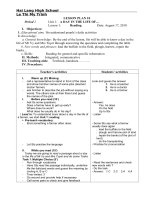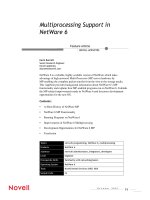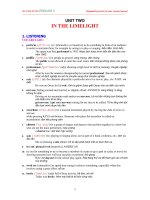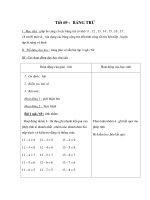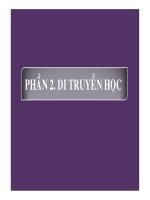Tài liệu Unit 2 : in the limelight pdf
Bạn đang xem bản rút gọn của tài liệu. Xem và tải ngay bản đầy đủ của tài liệu tại đây (258.55 KB, 8 trang )
LECTURE NOTES ENGLISH 3 Prepared by NGUYEN TRI TUAN – NGUYEN TUAN KIET
_____________________________________________________________________________________________________________________________
UNIT TWO
IN THE LIMELIGHT
1. LISTENING
VOCABULARY:
1. perform /pC
/
fc:m/ (v): [intransitive or transitive] to do something in front of an audience
in order to entertain them, for example by acting in a play or singing:
biu din, trình din
The opera was first performed in 1992: Nhc kch đc trình din ln đu tiên vào
nm 1992.
2. public /
/
pVblIk
/ (n): people in general: công chúng, dân chúng
The public is not allowed to enter the court room: Dân chúng không đc vào phòng
x án.
3. professional /
prC
/
feSCnl/ (adj): showing a high level of skill or training: chuyên nghip,
nhà ngh
After he won the amateur championship he turned professional: Sau khi giành đc
chc vô đch nghip d anh ta chuyn sang chi chuyên nghip.
4. role /
rCUl/ (n): the character played by a particular actor in a movie, play, etc: PART: vai
din
He won an Oscar for his role: Anh ta giành đc giI Oscar cho vai din ca mình.
5. nervous: feeling excited and worried, or slightly afraid: ANXIOUS: cng thng, lo lng,
không n đnh
Driving on icy mountain roads makes me nervous: Lái xe trên nhng con đng m
t khin cho tôi lo lng.
get nervous: I got very nervous waiting for my turn to be called: Tôi lo lng ch đI
đn lt mình đc kêu tên.
6. accordion /
C
/
kc:dICn/ (n): a musical instrument played by moving the ends of a box in
and out
while pressing KEYS and buttons. Someone who plays the accordion is called an
accordionist: đàn tiu phong cm
7. chorus /
/
kc:rCs
/ (n): a group of singers and dancers who perform together in a show but
who are not the main performers: hp xng
a chorus line: mt dàn hp xng
8. solo /
/
sCUlCU
/ (n): playing or singing alone, not as part of a band, orchestra, etc.: đn ca,
đc tu
She is releasing a solo album:
Cô ta sp phát hành mt an bum đn ca.
9. try out: phrasal verb [transitive] AMERICAN
10. try out for something to try to become a member of a team or get a part in a play or movie by
showing someone how well you can play or perform:
th ging
Rita’s trying out for the school play again: Rita đang th vai đ tham gia vào v kch
ca trng.
11. work on: [intransitive] to spend time trying to achieve something, especially when this
involves using a great effort: n lc
12. hectic /
/
hektIk
/ (adj): full of busy activity: b bn, sôi ni
Today was hectic: Hôm nay tht là b bn công vic.
1
LECTURE NOTES ENGLISH 3 Prepared by NGUYEN TRI TUAN – NGUYEN TUAN KIET
_____________________________________________________________________________________________________________________________
13. social life: noun [singular]
14. the time you spend enjoying yourself with friends: giao tip xã hi
2. VOCABULARY
VOCABULARY:
1. audience /
/
c:dICns
/ (n): a group of people who have come to a place to see or hear a
movie, performance, speech, etc. The people who watch a sports match or other large event
are
usually called spectators or the crowd: khán gi
2. lead singer: ca s hát chính
3. rehearsal /rI
/
hE:sl/ (n): noun [count or uncount]
4. an occasion when you practice for the performance of a play, concert, opera, etc: din tp, tp
din mt v kch
5. orchestra /
/
c:kIstrC
/ (n): noun [count]
6. a large group of musicians using many different instruments to play mostly classical music.
The person in charge of an orchestra is its conductor: ban nhc, dàn nhc
7. scene /
si:n/ (n): a part of a play, book, movie, etc. in which events happen in the same
place
or period of time: cnh, đan (trong phim, kch, tiu thuyt….)
8. stage /
steIdXZ/ (n): [count] the part of a theater where the actors or musicians perform:
sân khu
to go on stage: lên sân khu, lên sàn din
9. balcony /
/
bAlkCnI
/ (n): an upper floor in a theater that sticks out over the main floor: ban
công
10. band /
bAnd/ (n): a small group of musicians who play popular music such as jazz or rock:
11. a rock and roll band: ban nhc, nhóm nhc
12. calling /
/
kc:lIN
/ (n):
a strong feeling that you must do a particular type of job, especially one that you
consider morally good: ngh nghip thích hp, quan trng
FORMAL a job or profession, especially one that you consider important: mt công
vic, mt ngh nghip mà bn xem là quan trng
13. wind down: th giãn (nht là sau mt thI k cng thng hoc b kích thích).
In The Know:
Ü Madame Butterfly is an opera by Giacomo Puccini (1858 – 1924). It was written in
1903 and tells the tragic story of Japanese geisha who falls in love with and marries
an American military officer.
Madame Butterfly là mt v nhc kch ca tác gi Giacomo Puccini (1858 – 1924). V nhc kch
này đc vit nm 1903 nói v câu chuyn bi đát ca mt geisha ngI Nht yêu và kt hôn vI
mt s quan quân đI M.
2
LECTURE NOTES ENGLISH 3 Prepared by NGUYEN TRI TUAN – NGUYEN TUAN KIET
_____________________________________________________________________________________________________________________________
Ü Hansel and Gretel is an opera by Engelbert Humperdick (1854 – 1921). It was written in
1893 and based on the famous fairy tale about a brother and sister who get lost in a forest and
are held captive by a witch.
Hansel and Gretel là v nhc kch ca tác gi Engel Humperdick (1854 – 1921). V này đc vit
vào nm 1893 và da vào nI dung ca câu chuyn c tích nI ting v hai anh em b lc vào
trong mt khu rng và b mt m phù thy bt gi.
Ü The Magic Flute was the last opera by Wolfgang Amadeus Mozart (1756 – 1791) in 1791. It
is said to be the opera that meant more to Mozart than any of his other compositions.
The Magic Flute là v nhc kich sau cùng ca Wolfang Amadeus Mozart (1756 – 1791) đc
sang tác vào nm 1791. NgI ta cho rng đây là v nhc kch có ý ngha nht đI vI
Mozart hn bt k tác phm nào khác ca ông.
3. GRAMMAR (Tham khao theâm saùch Grammar Time)
Present Perfect Simple v/s Present Perfect Continuous
The Present Perfect Simple differs from the Present Perfect Continuous in:
PRESENT PERFECT SIMPLE PRESENT PERFECT CONTINUOUS
1. A one-moment action
• I have cut my finger.
1. An on-going activity
• I have been cutting the grass.
2. The activity stops after the
moment of speaking and you are
speaking about a result.
• I have painted the room. (finished)
2. The activity started in the past and is
continuing after the moment of
speaking (so not finished).
• I have been painting the room. (still
to finish it)
3. To place more emphasis on the
permanence of an action.
• My family have always lived in the
South.
3. Emphasize the temporary nature of the
action.
• My family have been living in the
South, but we are moving to the North
next month.
4. To talk about “how much…”,
“how many times…”, “how many
things…”
• I have written 3 books.
4. To talk about “how long…”
• She has been reading books on
computer science for two months.
5. To express irritation
• I have been waiting for them for
hours.
4. READING
VOCABULARY:
1. romantic /rCU
/
mAntIk/ (adj): making you have feelings of love and excitement: lãng mn
nh tiu thuyt
ö What could be more romantic than a wedding on a tropical island? Còn gì lãng mn hn là t
chc đám cI trên mt hòn đo nhit đi?
2. fast-paced /
fast peIst/ (adj): including a lot of different things happening quickly: nhiu
vic
xy ra nhanh chóng, trong bài này có ngha là bài hát có nhp nhnh
3
LECTURE NOTES ENGLISH 3 Prepared by NGUYEN TRI TUAN – NGUYEN TUAN KIET
_____________________________________________________________________________________________________________________________
3. tour /tUCr/ (n): a trip in which a person or group visits several different places in order to
play
or perform: chuyn lu din
4. lyric /
/
laIrIk
/ (n): the words of a song: lI bài hát
5. Cameroon /
kAmC
/
ru:n/ (a,n): thuc v đt nc Camarun, ngI Camarun
6. tongue /tVN/ (n): a particular way of speaking or writing, language: lI nói chuyn, lI vit
vn,
ngôn ng
ö What is your mother tongue?: Ting m đ ca anh là gì? (ngôn ng chính)
ö a sharp tongue (=a severe and unkind way of speaking to people): She has a very sharp
tongue: Co ta có li nói chuyn rt sc so.
7. melody /
/
melCdI
/ (n): a tune or song, especially a simple one: giai điu
8. harmony /
/
ho:mCnI
/ (n): musical notes that are sung or played at the same time, making a
pleasant sound: hòa âm
9. rhythm /
/
rIDCm
/ (n): a regular pattern of sounds in music that you can show by moving,
hitting
your hands together, or hitting a drum or other surface: nhp điu, gõ nhp
10. recall /
rI
/
kc:l/ (v): to remember something: nh lI, hI tng
11. the blues /
DC blu:z/ (n): a type of slow and sad music that developed from the songs of
black SLAVES in the southern U.S.:
lai nhc Jazz bun chm bt ngun t nhng b lc da
đen
min nam nc M
12. funk /
fVNk/ (n): a type of music that developed in the late 1960s from SOUL and early
ROCK
AND ROLL, containing lively drum beats, repeated electric bass lines, and often singing:
13. reggae /
/
regeI
/ (n): a type of music that developed in Jamaica in the 1960s with songs
about social and political subjects and heavy bass sounds: đây là mt lai nhc đc phát trin
Jamaica vào nhng nm 1960 vI nhng bài hát v ch đ xã hI và chính tr vI âm bass rt
mnh
14. contract /
/
kOntrAkt
/ (n): a written legal agreement between two people or businesses that
says
what each must do for the other or give to the other: hp đng
15. acclaimed /
C
/
kleImd/ (adj): publicly written and talked about in an admiring way: đc
tha
nhn, đc tán thng
16. festival /
/
festCvl
/ (n): a series of performances of movies, plays, music, or dancing that
is usually organized in the same place at the same time each year: đI hi, liên hoan
6. LANGUAGE IN ACTION: COMPROMISES
VOCABULARY:
1. presentation /
pri:zen
/
teISn/ (n): [count] a formal talk in which you describe or explain
something to a group of people: s trình bày
4
LECTURE NOTES ENGLISH 3 Prepared by NGUYEN TRI TUAN – NGUYEN TUAN KIET
_____________________________________________________________________________________________________________________________
2. article /
/
o:tIkl
/ (n): a piece of writing about a particular subject that is published in a
newspaper or magazine: bài báo
ö He has written several articles for The New York Times: Anh đã vit nhiu bài báo cho t
New York Times.
3. honestly /
/
OnIstlI
/ (adv): in a way that is honest and moral: mt cách chân thành, mt
cách thành tht
Language Note:
A compromise is an agreement about something which is acceptable to all people involved,
although it is not exactly what each person wanted. For example, John wanted $6,000 for his
car, but the price I wanted to pay was $5,000. Finally, after some discussion, we reached a
compromised and agreed on $5,500.
7. READING
VOCABULARY:
1. science fiction /
/
saICns
/
fIkSn
/ (adj): books and movies about imaginary future events
and characters, often dealing with space travel and life on other planets. Science fiction is often
called
sci-fi: truyn khoa hc vin tng
2. childhood /
tSaId
/
hu:d/ (n): the time of your life when you are a child: thI th u
ö We spent our childhood in a small town in the mountains: Chúng tôi đã trãi qua thI th u
mt th trn nh vùng đi núi.
3. filmmaker /
film
/
meIkC/ (n): a movie director, especially an independent director who has
full
control over the movies he or she makes: nhà làm phim, đo din phim
4. screenplay /
sri:n
/
pleI/ (n): a story someone writes for a movie: kch bn phim
5. blockbuster /
/
blOkbVstC
/ (n): something that is very successful, especially a movie, show,
or
novel: sách, phim… bán chy
6. reviewer /
rI
/
vju:C/ (n): someone whose job is to write articles in a newspaper or
magazine
giving their opinion about a new play, book, art exhibition, etc: ngI vit bài đim sách
7. blend /blend/ (v): [intransitive] to be combined with other things in an attractive or
effective
way: kt hp hài hòa
8. suspense /
sC
/
spens/ (n): [count or uncount] something that gets your attention and prevents
you
from concentrating on something else: tình trng hI hp
9. thriller /
/
TrIlC
/ (n): a book, play, or movie that tells an exciting story, especially about
something dangerous like a crime: truyn, phim git gân
10. best seller (n): a book that many people buy: sách bán chy
11. at heart: used for saying what someone’s basic character is: v thc cht
ö I’m really a country person at heart: Thc cht tôi ch là mt anh nhà quê.
5

